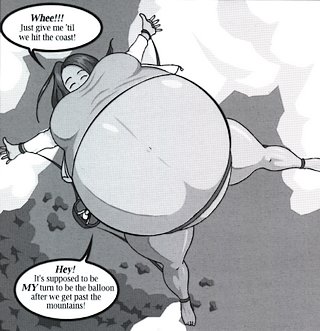The Cost of Sexual Weirdness
Sunday, June 28th, 2009 -- by Dr. Faustus
Last year, Bacchus blogged about a fetish map created by Franklin Veaux which I was delighted to behold. Bacchus provides a detail and Franklin the whole map and I highly recommend your having a look yourself.
While you’re looking, I want to suggest an exercise for you. Find something on the map that you think is a little weird, or maybe even a lot weird, but something that you can reasonably believe there is actually a group of people into, whether in actuality or just in fantasy. Then as a thought experiment, ask yourself how many of the people in this group are “out” about their fetish, in the sense that they tell their boss, their co-workers, their neighbors, and members of their families about it, compared with the number who are “out” about more “normal” sorts of sexuality that might be manifested by, say, having a spouse or a boyfriend or girlfriend.
Do you think “probably not that many?” I think that. But why not that many?
The obvious first-order explanation is that many fetishes are stigmatized: if you’re out about being into something weird, people will avoid you, gossip about you, exclude you from their company, not hire you for jobs, and so on. And that’s probably true. But what is the source of the stigma? Why is weird equated to bad?
Conservative moral sentiments and religious doctrines doubtless explain some of the stigma. Psychological research of the sort done by Jonathan Haidt suggests that conservative are wired up with intuitions about purity and disgust in a way that liberals, who focus primarily on fairness and harm avoidance, are not. (This is an oversimplification of Professor Haidt’s views, but should do for here. Readers interested in more detail can read a PDF version of one of his major papers here.) But I don’t think that’s the whole story, because I don’t think people are that “out” to their secular, liberal, nonjudgmental bosses, co-workers, neighbors, and family members either. Even if your same-sex partner would be welcomed with open arms at the company picnic or the family reunion, your RealDoll will probably not be. My aim is to offer a conjecture as to why that might be (and maybe throw in some naughty pictures along the way).
Begin with the observation that sex involves both imagination and physics, but these are not always equally proportioned in all the things that one might do. As a rough general principle, the more imagination dominates over physics, the weirder what you’re doing is likely to seem, at least to people outside your practice. Sex with your spouse does not strike anyone as weird. Through in some extra imagination, say sex where your spouse pretends to be Elizabeth I (where your spouse is a woman) and you pretend to be Sir Walter Raleigh (if you are a man) strikes most people as a little weird. Making it even more imaginative, say if you are a man who pretends to be Elizabeth I while his wife pretends to be Sir Walter Raleigh — I’m not sure exactly how that’s supposed to work but never count out human ingenuity with props and costumes — will probably strike most people as weirder still.
Among the weirdest things in human sexuality are those in which the imagination has to take over entirely (or almost entirely, since they might be coupled with the de minimis physics of masturbation), because their realization is technically impossible. You can dress up in a fursuit and roleplay, but you cannot actually transform into a furry. Some people might play at freezing games, but something like this cannot be made to happen:

(Source: Medusariffic )
Not, at least, short of someone’s mastery of truly Promethean nanotechnology. (And by the way, I hope the technology is Promethean enough to be reversible, becasue otherwise this strikes me as something not at all nice to do, even to a voluntary submissive.)
Some other things I am somewhat at a loss to figure out how someone would role-play, like this inflation fetish shown in Agnès Giard’s Le Sexe Bizarre (p. 117):

Dialogue: Tiny woman in a basket beneath: “Hey! It’s my turn to be the balloon after we get past the mountains!” Inflated woman above: “Whee!!! Just give me ’til we hit the coast.” No, I can’t say I really understand, except that somebody clearly took the trouble to create this image and write the dialogue, so presumably it matters to him or her.
If you enjoy weirdness, you have a fair amount of imagination. And imagination is a good thing, right? Well, as it turns out, it depends on which perspective you’re occupying.
The problem is this: much of life is drudgery. It’s true on the job. Even in high-powered professional jobs, much of what you’re doing from minute to minute involves close concentration on stuff that is going to be boring. Corporate recruiters may like to represent their workplaces as venues of free-spirited creativity, but the reality of what goes on there is very different and no one more than a year or so out of school will be fooled. Proofread that contract. Check those figures in the spreadsheet. Spot check the work of your subordinates to make sure there are no errors. Decipher the squiggles on the chart. And it’s true at home as well. Much of your time there will be spent paying bills, doing dishes, cleaning up. Even time spent with one’s children is often pretty tedious. Unfortunately, diligent performance of drudge-work is a large part of what other people really want from us. Your boss really, really wants you to check those figures accurately. Your spouse really, really wants you to look after the kids.
But if you have powerful imagination, especially a powerful sexual imagination, then the opportunity cost for drudgery is going to be high. Imagination competes with diligent drudgery for time and mental energy. The more imagination you have, the better the hedonics of imagination, but that means that for every minute of drudgery, the more pleasure foregone. And what does the most basic economics of opportunity cost tell us about what happens when the opportunity cost of X goes up? Precisely. Less X.
So if you advertise that you are sexually weird, you might be inviting people to draw the inference that other things being equal, you will be a worse employee or spouse or whatever than someone whose interests are more conventional (think golf, or lawn care, or something). You will face temptations to slack off that other people won’t have. Other people won’t like that.
Is it any wonder, then, that people who are weird go to some lengths to conceal the fact?
It saddens me, because I guess I’m sort of weird myself. (I mean, here I am, spending part of Sunday morning on social-psychological conjecture.) I don’t have a ready fix, even if I wish I did.








